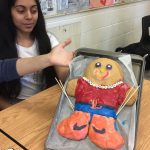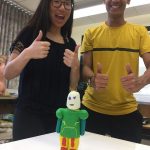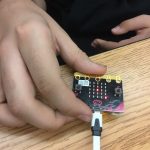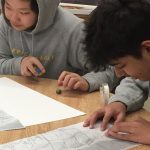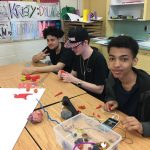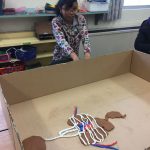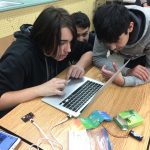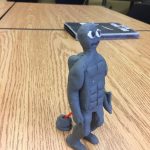For the Computer Supported Learning course, I wrote an essay about how to develop Global Citizenship Education (GSE) through activism and participatory media. GSE “equips learners with the knowledge, skills and values to navigate and live together in an increasingly interdependent world and to work collectively toward solutions to the planet’s pressing problems” (Truong-White & McLean, 2015). I want to share two metaphors that came from the research for this paper. The starfish thrower, based on a story by Loren Eiseley, essentially helps justify helping the ONE starfish by throwing it back in the sea, even though there are thousands on the beach that will die in the sun, because even though it will not make a difference, it makes a difference for that ONE starfish. But what if that starfish, in its infinite natural wisdom, knew that it was time for it to die and did not want to be saved? Another metaphor is the story of children drowning in a river with a strong current. Of course, unlike the starfish, we know for certain that children do not want to drown. We try to save them. But then we look upriver and see boats with people throwing children into the river and there are more and more boats coming. What do we do? Andreotti and Pashby (2013) describe 4 responses: “rescuing the children in the water, stopping the boats from throwing the children in the water, going to the villages of the boat crew to understand why this is happening in the first place, and collecting the bodies of those who have died to grieve and raise awareness of what happened.” They call this “going upriver” to find the root cause of the problem. The added complication to today’s GCE-oriented teacher is that viral media usually means there is no context for issues that are spread around the world and they are almost certainly shared without questioning what the people are doing to help themselves and how they want to be supported? Perhaps they are satisfied with their culture (not dying children, of course) and find fulfillment in a different way of living. Going upriver. It’s complicated. 6/100 #100LSreflections #100dayproject
Tag Archives: 100dayproject
Lifelong World Changers
I am in the middle of writing the methodology chapter for my proposed design-based research study that will lead to my EdD dissertation. My current research questions are about how can critical place-based education be used to design a pedagogical framework which engages students in activism and can this framework increase students’ agency for activism.
I have come to understand that my desire to focus on how to increase student agency for activism comes partially from the lack of agency for activism that I have experienced in my own life. There are so many instances of me wanting to “do something” but not following through. I wanted to be a “Big Sister” but didn’t do it. I wanted to volunteer with animals or to clean up the local wetland conservation area in the spring. I wanted to save the world. Instead, I focussed on my family, or that’s what I told myself—as if the two where mutually exclusive. For example, I coached soccer for many years and became “Brown Owl” when my daughter was in Brownies. I made my children’s lives the best I could but I did not follow a personal passion for making the world a better place. I did a good job at being a mom and am proud of the wonderful adults my children have become. But it took joining a sorority for my daughter to learn service. It didn’t come from my example.
If I had participated in activism in school alongside my peers, and gained skills and knowledge on how to create positive change in my community, would things have been different? Would I have continued to volunteer or be civically engaged throughout university and into marriage and motherhood? I believed that personal fulfillment through service or “giving back” was my right and an opportunity would eventually just be presented to me on a silver platter. Of course this is not how the world works. I want students to know how important they are to the world right now and throughout their lives—how important their ideas are, their passions, their solutions. I want to help them develop the attitudes and tools to be able to be lifelong world-changers. #100LSreflections#100dayproject 5/100
Growth Mindset for Academic Writing
Academic writing is not my strong suit. I finished my masters degree in 1994. It had been over 20 years since I had written anything for a course that wasn’t a lesson plan or a reflection when I started to write my first paper in the summer of 2016. That first paper was excruciatingly hard. If I could wish for anything, it would be to be able to write quicker. I’m a pretty good writer but I am SLOW. If I am “on a roll” it will take me about 3 hours to write a page (about 250 words). But it takes about 2-3 full days of focussed work to get on a roll. This luxury of time is available to me in the summer, but not during the school year, so I have really struggled with my courses during the fall and winter terms. I love the research part though. Searching out sources, reading, reading and reading some more, defining words (remember those vocab lists from my first post?), going down “rabbit holes” into interesting topics that are not-exactly-but-maybe-relevant (to justify the time), making connections and then, finally, there’s no more time. It’s time to write or die. All the profs said to write daily. They said to get into a daily habit of writing without fail. If only I had listened to them! But I thought, “How can I write until I’ve finished the research?” Looking back, I see that I also did not allow myself to be a novice. After having supported Grade 12 students for 15 years as they learned how to write argumentative essays and editing those essays, I felt that I should be able to do it easily. I had to get it right the first time, without major edits and it had to be brilliant! These thoughts are paralyzing. Well, I believe in a growth mindset, not just for my students, but for myself as well. I have a lot of writing left in this degree. I can develop the habit of writing daily. I think I just started that habit about 4/100 days ago. #100LSreflections #100dayproject.
ConstrucTIONist
All my classes were based on a construcTIONist (Papert) epistemology today. Grade 10 Science were designing and making a model of all the body systems. Grade 9 Science just finished making atomic superhero models and videos and today were discovering how to program Micro:bits (this student did a “rock, paper, scissors) and Grade 9 Geography were making 3D maps of Canada. All these things are Papert’s “objects-to-think-with” which allow students to build “knowledge structures” through social interactions (Piaget’s construcTIVism which Papert felt happens easily when constructing “a public artifact” of the learning). I did not know these theories of knowledge before starting the EdD program, although I did use a social constructivist pedagogy, I didn’t know it. 🙂 Learning Scientists study both the science of how we learn and how to design effective, innovative learning environments, tools and teaching strategies. We need to have a solid foundation of educational theory to do this. I remember a heated debate about Knowledge building (with a capital K) and knowledge (with a small k) (Scardamalia and Bereiter). Good times! #100LSreflections #learningsciences #100dayproject 3/100
779 Tribe

The second part of my first post for #100dayproject is about my tribe–csl779 EdD we call our WhatsApp group. On the first day of our Intro to Computer Supported Learning class, just like all good teachers, our prof gave us a BINGO game to get to know each other. But this bingo had characteristics like “has made a QR code” and “taught an online course” and “has a makerspace.” Almost everyone knew what all the acronyms meant and what the tools were for. There was an immediate feeling of belonging and of finding your tribe. It has been a privilege to journey through 6 courses and 2 collaboratories with these incredible educators from all over the world. We all are extremely supportive of each other and a few are now very close and dear friends. If you are choosing a grad program, look for a well-run cohort. I could not have gotten this far without one! #100LSreflections 2/100
100 Learning Sciences Reflections

It’s been almost 2 years since I started a doctoral program in #LearningSciences at University of Calgary and will soon need to write a learning reflection of those two years for my candidacy portfolio. For the #100dayproject, I will reflect on the significant ideas, people and events that have influenced my personal development and research direction. That’s what I love about the project…it’s really for yourself, focusing on something that brings meaning and joy to your life. If others enjoy it too, well that’s a remarkable bonus. My first post is in two parts. The first is an Evernote screenshot of some vocabulary from my readings for the first courses. I was so excited to get started, but found that my lack of background in philosophy meant that I had a lot of catching up to do. So many new words–so familiar to me now–were just out of my reach at the beginning. It was almost refreshing–isn’t that what a degree is for? To push you to new ideas, fresh ways of looking at the world? I got that in spades. And many, many vocab lists. #100LSreflections 1/100


